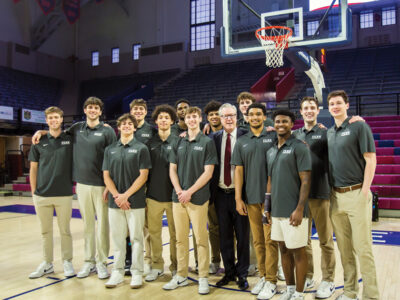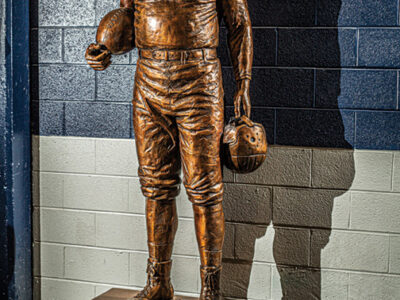By David Porter
There is no handy set of rules that explains how to absorb the type of anguish the Penn football team faced this season; no road map negotiating the minefield of emotions that followed the stunning death of senior running back Kyle Ambrogi on October 10 in what was reported as a suicide. Whenever the life of a young athlete is taken, a chunk of the sports lexicon is immediately trivialized, and rightly so: words like “loss” and “adversity” and “resilience” suddenly sound hollow when used to describe things like a two-game losing streak or a nagging injury.
The games must go on, of course, and of all the games played at the collegiate level football requires some of the heaviest physical and emotional expenditures week in and week out, even under the most ideal of circumstances. That is the unavoidable context in which the Quakers’ 5-5 season must be viewed.
“The best way to describe the situation was that it’s something you can never really prepare yourself for,” said senior linebacker Ric San Doval, one of two Quakers to be named first-team All-Ivy along with senior cornerback Michael Johns. “This is the closest personal loss I’ve ever suffered in my life, aside from losing my grandmother. You’re going on pure emotion, just grinding it out. But you can only expend so much emotion, and what you saw was the team running out of it.”
Ambrogi’s death came two days after Penn defeated Bucknell 53-7 at Franklin Field, and the Wharton senior’s passing was noted on ESPN’s “Sports Reporters” the following Sunday by host John Saunders. The Quakers, meanwhile, had no choice but to keep moving forward. They trounced Columbia 44-16 the next week, then returned home to defeat Yale 38-21 in a cold rain at Franklin Field in a game in which they led 38-0 after three quarters. Looking back, the fact that Yale scored three touchdowns in the fourth quarter may have provided some clues to what lay ahead: losses in the final four games by a combined score of 109-40. An equally valid explanation could be that the Ivy League was simply more competitive this season, illustrated by the fact that five Ancient Eight teams finished with records above .500.
“A lot of things happened, but really this was the first time in a while that the league was pretty equal,” said San Doval. “No one was beating everybody 44-7 like we did in my junior year. It was a very tough Ivy League schedule this year.”
That was true both individually and collectively, as Penn fell victim to some outstanding performances by opponents in its final four games: At Brown, Nick Hartigan ran for 167 yards and two touchdowns in the Bears’ 34-20 win; Princeton’s Jeff Terrell threw three touchdown passes in the Tigers’ 30-13 win at Franklin Field on November 5, and Harvard’s Liam O’Hagan threw three touchdown passes to Kelly Widman and ran for one himself to lead the Crimson to a 29-3 win the following week.
That led to the home finale against Cornell, a team Penn had defeated five consecutive times. Two of those victories at Franklin Field had come a week after losses at Harvard that had knocked the Quakers out of the Ivy title race. In that respect, the Cornell game had served as a salve; this time, there was no relief to be had, despite a career-high 18 tackles by San Doval in his final game at Penn.
“It was another frustrating day for us,” coach Al Bagnoli said after the 16-7 loss. “It was as if we were pressing so hard to make plays that we missed some good opportunities.”
One play that defined Penn’s frustration came early in the fourth quarter with Cornell holding a slim 10-7 lead. Two Quaker defensive backs converged on a Cornell receiver in the end zone and appeared to have a chance to intercept a pass by Big Red quarterback Ryan Kuhn, but they collided and knocked over the Cornell player for a pass interference penalty that gave Cornell a first down on the Penn 19. Four plays later Kuhn scored what turned out to be the game’s final points.
There were promising postscripts to the season, not least of which was the often forgotten fact that this senior class finished its career with a 32-8 record. In addition to the first-team honors for San Doval and Johns, five Quakers were named second-team All-Ivy—running back Joe Sandberg (a junior), punter Anthony Melillo (sophomore), offensive lineman Marko Grzan (junior) and defensive linemen Jim Malizia (senior) and Naheem Harris (sophomore). Six—tight end Chris Mizell (junior), offensive linemen Don Snyder (senior) and Sean Estrada (junior), defensive lineman Brian Fairbanks (junior), linebacker Kory Gedin (junior) and defensive back Scotty Williams (junior)—received honorable mention.
Ten of the honorees will be back next season, when for only the third time in Bagnoli’s 14 years at the helm—the second time if the five forfeited games in 1997 aren’t included—the Quakers will look to rebuild after a season in which they did not get above .500.
“For the seniors, it was a wonderful four-year stretch. They have dealt with things they hopefully will never have to deal with again,” Bagnoli said after the Cornell game. “My job now is to try and figure this thing out.”

Coaches will often say they can learn more about their team when it loses, in which case men’s basketball coach Fran Dunphy should have had a pretty good idea of where his team stood after its sixth game of the season. That would have been the one at No. 1-ranked Duke on December 7, in a game the Quakers lost 72-59. It was a far more respectable performance than Penn’s last game against a No. 1 team, when the Quakers lost 93-60 at Massachusetts in January 1995.
The Quakers played a respectable game in a 72-59 loss to No. 1-ranked Duke on December 7.
Penn came away knowing it had made the Blue Devils sweat late in the game when they trailed the hosts by just 10 points with six minutes remaining and a well-timed 3-pointer or two could have made things even more interesting. The Quakers shot a respectable 13-for-28 (46 percent) in the second half and didn’t let the game slip into garbage time until the final minute.
Junior Ibrahim Jaaber led Penn against Duke with 16 points and was averaging a hair under 20 as the Quakers split their first six games. An early pleasant surprise for Dunphy was the play of freshman Brian Grandieri, who was averaging five points and five rebounds. The only clunker in the first six games was a 78-60 loss to Colorado at the Palestra on November 29 in which Penn tied the Buffaloes at halftime but shot 9-for-31 (29 percent) in the second half and went nearly four minutes without a field goal.
David Porter C’82 writes for the Associated Press.




